We are back in the third post of our series about Egypt’s Wadi El-Hitan Climate Change Museum in Fayoum.
In 2017, I paid a visit to Wadi El-Hitan or the Whale valley in a quick visit to the beautiful Fayoum governorate. In the first post of this series, we shared the history of Egypt’s fossilized Jurassic Park as well as part of its indoor museum.
In the second post, we continued our visit to the very rich indoor museum in the valley.
Now we continue our trip in this post to the UNESCO World Heritage Site but this time we visit the outdoor museum.
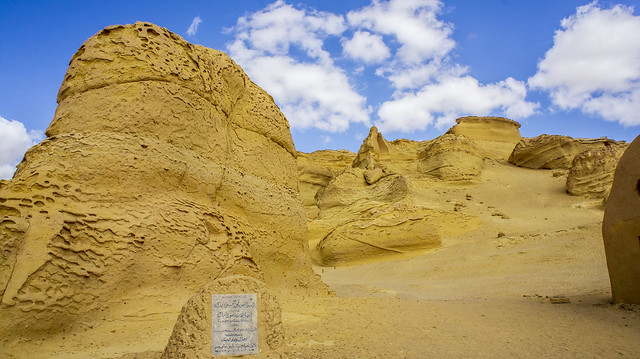 |
| Inside Wadi El-Hitan Protectorate in Fayoum's desert |
When you finish visiting the indoor museum, you go outside carrying your backpack or whatever but you must have a bottle of water to keep you hydrated and must wear your best hiking shoes because you will have one hell of a hike in the middle of the desert.
You will see why.
 |
| Inside Wadi El-Hitan Protectorate in Fayoum's desert |
Head for the trail in front of you and just imagine that this was a huge ocean bed from millions of years ago.
 |
| The road to the outdoor museum and its exhibits from fossils |
The trail takes you up to a hill and seriously it is one of the best hikes I have ever taken so far.
 |
| The way to the fossilized exhibits at the outdoor museum |
A little warning and spoiler: I did not visit all of the outdoor museums that extend many meters in the desert, unfortunately.
For geology lovers, their eyes will catch a lot of formations that were something from some 45 million years ago.
 |
| Inside Wadi El-Hitan Protectorate in Fayoum's desert |
To the exhibits.
The skull and vertebrae of a Basilosaurus whale are embedded in hard sandstone.
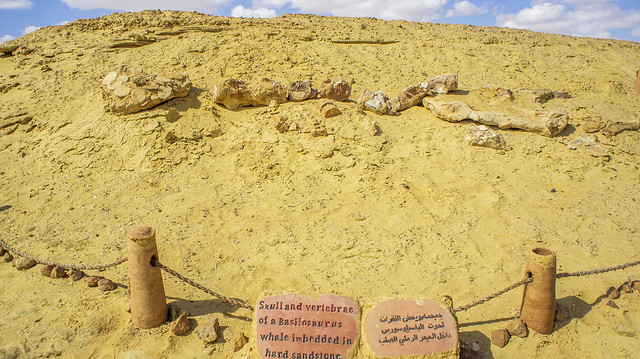 |
| Skull and vertebrae of a Basilosaurus whale embedded in hard sandstone |
Here is a zoom-in out of the focused photo of the Basilosaurus’ skull.”I guess”
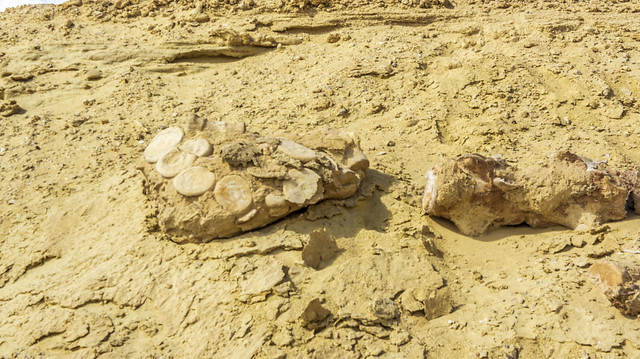 |
| May be a Basilosaurus whale's skull !? |
It is the first Basilosaurus whale I would meet and see in the outdoor Museum.
Unlike the indoor museum, I wished then the museum administration put beside the exhibits more information other than their names and numbers like when they were discovered and when they lived.
To the skeleton of the Dorudon Atrox whale.
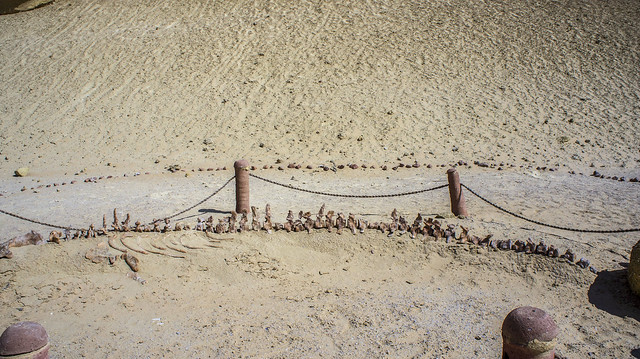 |
| The skeleton of Dorudon Atrox whale |
Another shot of the skeleton from another angle.
 |
| Another shot for the Dorudon Atrox Whale |
We also got in the indoor museum skeleton of the Dorudon Atrox whale.
The third exhibit in the open museum was a skeleton of a Sirenia,
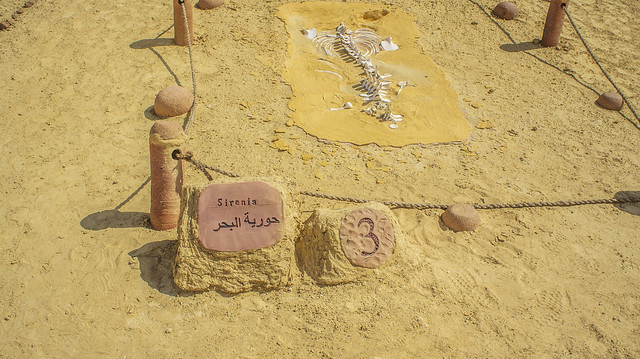 |
| Sirenia skeleton |
Sirenia was the great great ancestor of sea cows and dugongs from the Eocene era.
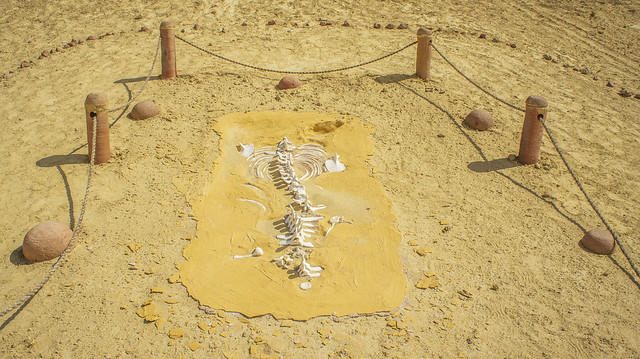 |
| Another shot for the Sirenia skeleton |
Again Egypt has dugongs in the Red Sea and despite being a vulnerable specie worldwide yet somehow it is fine in Egypt for some odd reason.
It turns out that fishermen do not like fishing dugongs or sea cows as they are known in Arabic because fishing them will bring bad luck. Superstition is good in this case.
Exhibit four is another Dorudon Atrox whale.
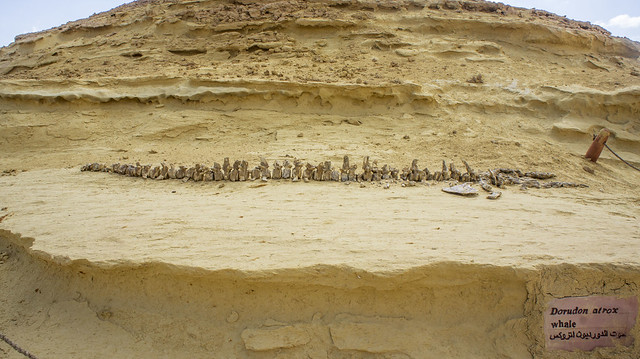 |
| Another Dorudon Atrox whale |
Remember we are in the valley of the Whales
So seeing the Basilosaurus skeleton again is not a surprise.
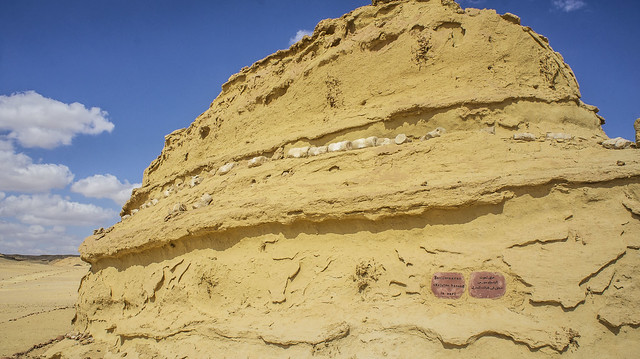 |
| The Basilosaurus sketelon hanged in a marl |
Here is a Basilosaurous skeleton hanged in marl
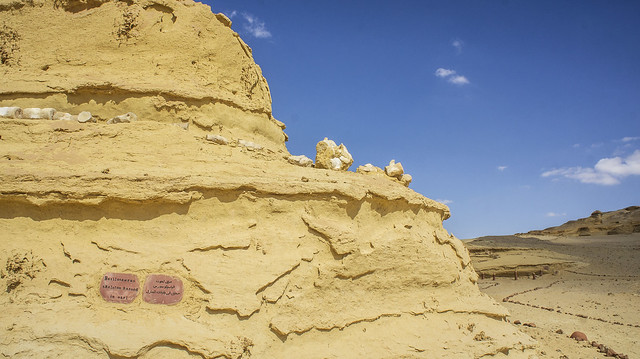 |
| Basilosaurous skeleton hanged in marl |
I just wonder how those creatures ended up in those places. Was it natural death !? or was it some cosmic event that led to their death in those different places in what once was a vast ocean !?
To the short-toothed sawfish remains.
 |
| Shorttoothed sawfish remains |
It was the sixth exhibit in the outdoor museum.
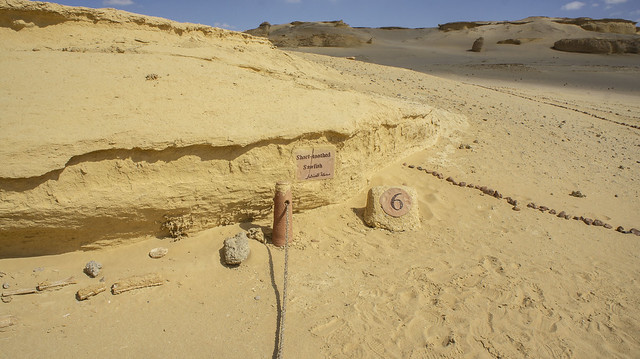 |
| Exhibit no.6 : Shorttoothed sawfish |
There was some sort of skeleton remains above the remains I guess but I can’t find its name.
 |
| Do you see darker cylinder shapes like vertebrae in that formation above the exhibit? |
It was not exhibit 7 because here was exhibit no.7
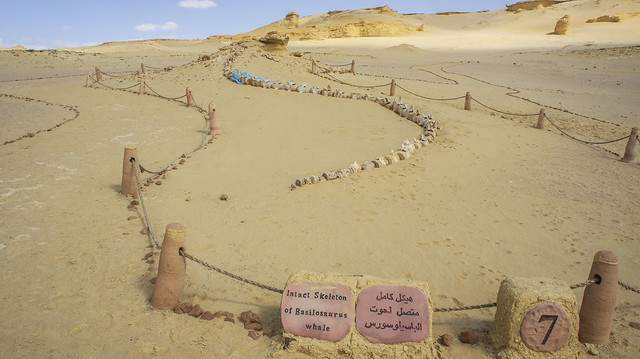 |
| An intact skeleton of Basilosarus whale |
Exhibit no.7 was another intact Basilosaurus skeleton.
I wanted to get inside to remove that stupid plastic bag that flew from God knows where to get tangled in the skeleton.
Now because it was truly a long hike, I did not prepare myself and I felt tired, so I stopped my hike in the outdoor museum here.
Already there were still many miles with many exhibits to cover. I returned back unfortunately to my hotel but this is not the end of the tour nor the end of that post or the series of those posts.
What took my breath away and makes me want to return once again to Wadi Al-Hitan was the amazing scenery which I can’t describe in a few words.
Aside from the priceless exhibits, the view was amazing everywhere.
 |
| Inside Wadi El-Hitan Protectorate in Fayoum's desert |
I must say that the location reminded me of the Star wars settings and once again like many Egyptians, I wonder when the government will allow big studios to film their films and shows in our deserts like in Morocco, Jordan and UAE as well as recently in Saudi Arabia.
 |
| The way to the exhibit |
The name of the area is the Whales valley but actually, as I hinted earlier that valley ascends somehow into a hill.
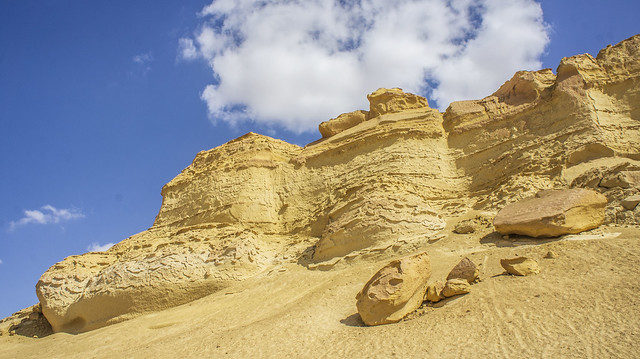 |
| Inside Wadi El-Hitan Protectorate in Fayoum's desert |
The road to that hill goes miles and miles into the desert.
It is not paved but rather bordered by those ball-shaped things.
 |
| Those ball shapes were markers for your course |
If there is an exhibit, you will be led using a sideway like that.
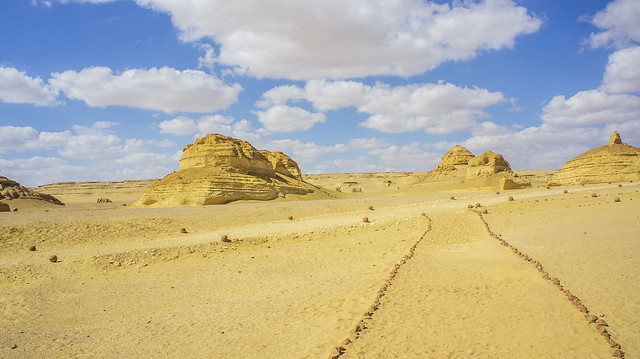 |
| The way to the exhibit |
Already I knew if I continued in reaching the end of the museum, I might spend till late at night as I was snapping photos of every step because of that natural minimalist clear beauty.
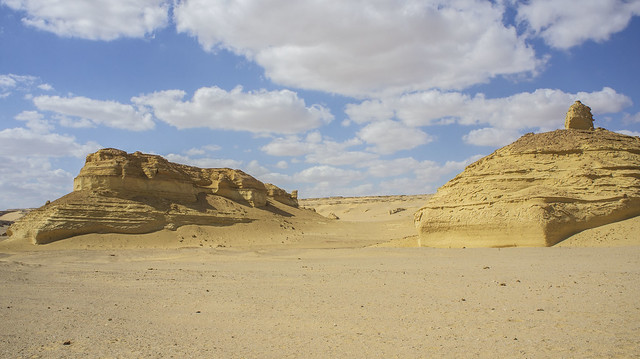 |
| Inside Wadi El-Hitan Protectorate in Fayoum's desert |
There is a place for camping in the protectorate and according to what I know it is best to avoid it in summer because of the incredible heat.
 |
| Inside Wadi El-Hitan Protectorate in Fayoum's desert |
I think the best one to ask about the perfect timings for camping there is the famous Mohamed of Fayoum aka Fayoumer.
 |
| Inside Wadi El-Hitan Protectorate in Fayoum's desert |
It was like another world for real.
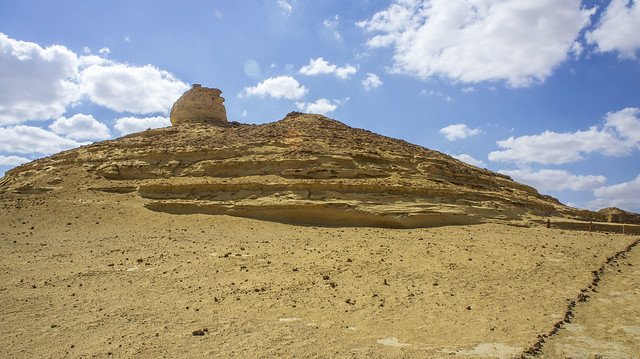 |
| Inside Wadi El-Hitan Protectorate in Fayoum's desert |
And again I did not play or edit in the clouds, they looked like that for real. I can't lie but I wanted to climb those formations.
 |
| Inside Wadi El-Hitan Protectorate in Fayoum's desert |
My guide who was a very young local from the Fayoum Arabian tribes was a bit bored as I stood every two seconds to snap a photo.
 |
| Inside Wadi El-Hitan Protectorate in Fayoum's desert |
I wish I knew Fayoumer during that time for real.
 |
| Inside Wadi El-Hitan Protectorate in Fayoum's desert |
Somehow when I look back at the photos I feel the valley has more to tell us than we already know.
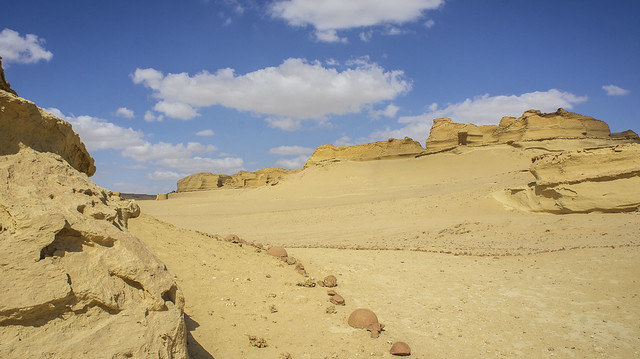 |
| Inside Wadi El-Hitan Protectorate in Fayoum's desert |
Again it is just crazy to imagine how high the sea levels or the ocean levels were millions of years ago but this is true evidence of climate change for all those deniers.
I am not a geologist “but I had 49 out of 50 in geology in high school so yes, I like this stuff", I tried to know more about the formations in the area and I failed. I wish the protectorate add more about some of the major formations or the interesting and unique ones.
 |
| Layers upon layers |
It will be a very good living example for the children to see the different types of geological formations live in their country.
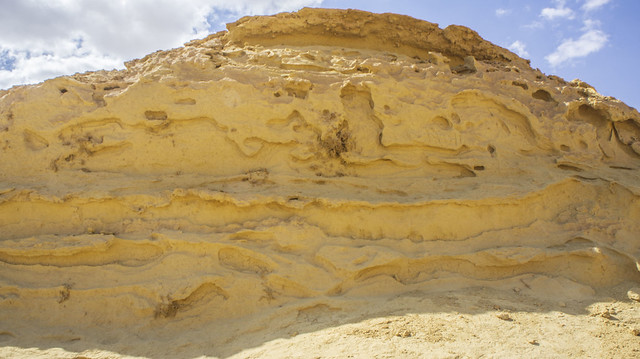 |
| What is that thing !? |
This caught my eye, I am not an expert but I felt it was something else from millions of years ago.
 |
| It was once a live thing |
I do not know if it is fossilized plants or corals or just old dried plants and corals but it is interesting for real.
 |
| Inside Wadi El-Hitan Protectorate in Fayoum's desert |
I will stop our tour here but it is not over yet as in the next post inshallah in this series we will see a video and continue seeing the rest of the photos “I took 100s of photos on that day alone” inshallah in a special wrap quick tour in Fayoum’s Wadi El-Hitan.
If you are interested in visiting Fayoum, I advise you to check Trip Advisor and Fayoumer's website.

No comments:
Post a Comment
Thank You for your comment
Please keep it civilized here, racist and hateful comments are not accepted
The Comments in this blog with exclusion of the blog's owner does not represent the views of the blog's owner.